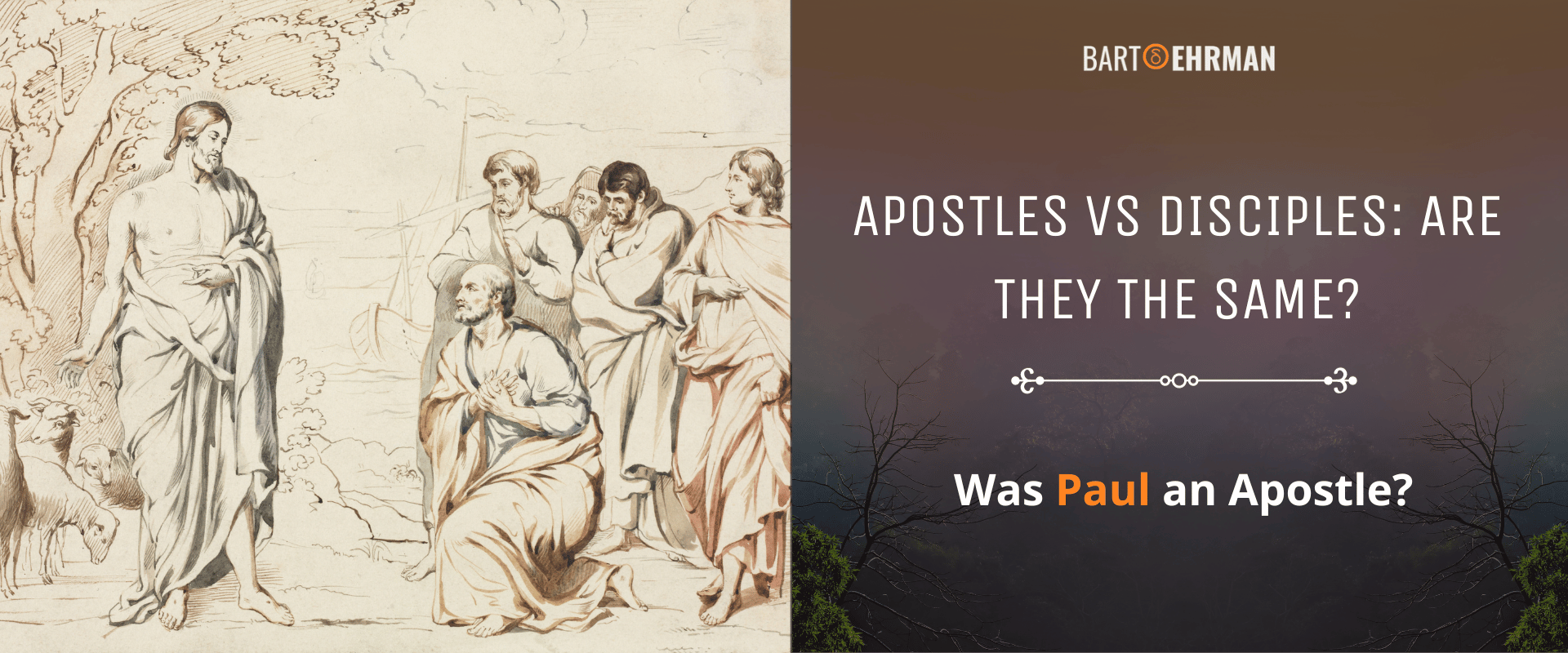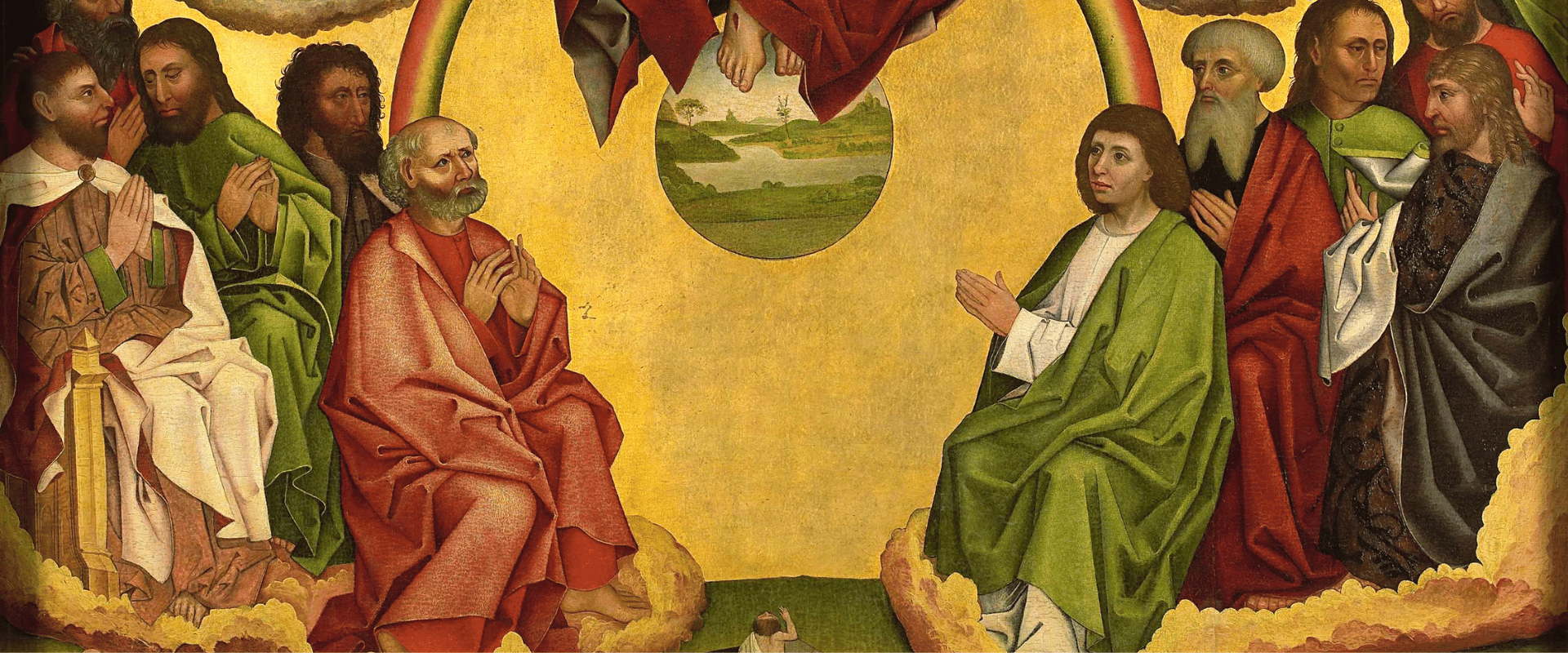Apostles vs Disciples: Are They the Same?

Written by Marko Marina, Ph.D.
Author | Historian
Author | Historian | BE Contributor
Verified! See our guidelines
Verified! See our editorial guidelines
Date written: November 28th, 2023
Edited by Laura Robinson, Ph.D.
Disclaimer: The views and opinions expressed in this article belong to the author and do not necessarily match my own. - Dr. Bart D. Ehrman
In the rich tapestry of early Christian history, two groups stand out for their pivotal roles in shaping the nascent faith: the Apostles and the Disciples. Often mentioned but rarely dissected in-depth, these early followers of Jesus were instrumental in laying the foundations of what would become one of the world's most influential religions.
But who were these individuals, and what distinguished them from each other? Was it their proximity to Jesus, their roles within the early church, or perhaps something more profound? This article delves into the heart of these questions, unraveling the intricate web of historical, religious, and cultural threads that define the Apostles and the Disciples.
This exploration isn’t just a mere recounting of historical events; it’s an attempt to understand the essence of what it meant to be an Apostle or a Disciple in the early Christian world.
Perhaps, there isn’t a better case study than Paul. Was Paul a disciple or apostle? As we’ll see, Paul’s vigorous defense of his apostolic status to the community in Galatia offers a unique lens through which to view these roles.
Join us as we traverse the annals of history to uncover the story of Jesus' disciples and apostles.

Apostles vs. Disciples: Etymology and Meaning
As we established in our earlier article, the word “apostles” comes from the Greek ἀπόστολος, meaning “one who is sent out” or simply a “messenger”. In the context of Jesus’ public ministry, the term “apostle” referred primarily to 12 individuals chosen by Jesus to be his closest followers and to carry out missionary efforts.
How should one understand the term “disciple”? It derives from the Greek “μαθητής” which means "learner", "student" or “disciple”. The root of μαθητής comes from the Greek verb "μανθάνω", meaning "to learn" or "to understand.".
In the Greco-Roman world, the concept of a "disciple" or "student" was closely tied to the tradition of philosophical schools. Philosophers like Plato, Aristotle, and the Stoics had their followers or disciples who adhered to their teachings and philosophies.
The relationship between a teacher (or master) and a disciple was foundational in these philosophical schools. Disciples would learn not just through formal instruction but also by observing and emulating their teacher's way of life.
Being a disciple in this context was about more than just acquiring knowledge. It involved a holistic formation encompassing moral, ethical, and practical dimensions of life. The aim was often the cultivation of virtues and character, aligned with the specific teachings of the school or master.
Despite sharing the broader cultural context of student-teacher relationships, early Christian discipleship introduced distinctive elements such as the focus on the teachings of Jesus as a path to physical and spiritual salvation.
Furthermore, unlike some philosophical schools which might have been exclusive, early Christian discipleship was more inclusive, extending beyond cultural, social, and gender boundaries prevalent in the Greco-Roman world.
Jesus’ Public Ministry: When did the Disciples Become Apostles?
In his book Vie et destin de Jésus de Nazareth, French historian Daniel Marguerat points out the fascinating influence that Jesus, even though he was active publicly for no more than 3 years, left behind.
But even during his public ministry, a preacher and self-proclaimed prophet from Nazareth gained a substantial number of followers. How many disciples did Jesus have? Determining the exact number can be challenging.
As it turns out, in the context of Jesus’ public ministry, the term “disciple” refers broadly to anyone who followed Jesus and his teachings. This category can be divided into three circles:
How many of the original disciples were also apostles? The gospel accounts are in agreement: Jesus chose 12 disciples to be his closest followers. Already during his life, they became known as the 12 Apostles.
However, Jesus had other followers beyond those 12 apostles. The Gospels and other New Testament writings occasionally reference larger groups of disciples.
Take, for instance, the Gospel of Luke 10:1 which mentions the "Seventy" (or "Seventy-Two" in some manuscripts) whom Jesus sent out in pairs to prepare towns for his visits. Moreover, the gospels also make it clear that Jesus' followers included women. Mary Magdalene, Joanna, Susanna, and others are mentioned as supporting Jesus' ministry and being present at key events.
In his Biography of Jesus, John P. Meier lays out the basic criteria for being a disciple (broader category) of Jesus:
As Meier explains: “Jesus’ initiative in summoning a person to discipleship is a necessary condition for becoming his disciple. A dedicated adherent’s sincere desire to follow Jesus isn’t of itself sufficient.” In other words, Jesus is the one who makes the call to someone who in turn accepts the call and becomes Jesus’ disciple.
This call can be direct (as in the case of the 12 apostles) or indirect via some form of healing or exorcism. The latter would include women such as Mary Magdalene who Jesus freed from torment by an exorcism. The act of exorcism could be understood as equivalent to being called to follow Jesus.
Another important condition of discipleship clearly illustrated in the gospels is the literal meaning of following. Jesus expects his disciples to follow him physically, as he undertook various preaching tours of Galilee, Judea, and surrounding areas. The whole idea of becoming a disciple, as Meier notes, was to leave family ties and property to follow Jesus.
Did You Know?
Mary Magdalene was historically mischaracterized as a prostitute, a portrayal that has no basis in the New Testament texts. The person most responsible for this unjust misrepresentation is the 6th-century pope named Gregory the Great. In this homily, he conflated Mary Magdalene with the sinful woman in Luke 7:37 and with Mary of Bethany, leading to the widespread belief that Mary Magdalene was a former prostitute.
FREE COURSE!
WHY I AM NOT A CHRISTIAN
Raw, honest, and enlightening. Bart's story of why he deconverted from the Christian faith.
Over 6,000 enrolled!
Apostles vs. Disciples: Key Differences
To understand when the disciples became apostles, we need to unpack the key differences between these two categories. Apostles were specifically chosen by Jesus during his public ministry as the members of his closest circle.
Moreover, Jesus promised that 12 apostles would have a prominent position in the future Kingdom of God. The author of the Gospel of Matthew recounts Jesus’ words to his apostles: “Truly I tell you, at the renewal of all things, when the Son of Man sits on his glorious throne, you who have followed me will also sit on twelve thrones, judging the twelve tribes of Israel (Mt 19:12).”
Furthermore, the 12 apostles were with Jesus from the beginning of his ministry as he traveled around Galilee preaching the apocalyptic message of God’s kingdom. Consequently, they form the first circle around Jesus.
When did they as disciples become apostles? The answer, in the strict sense of the word “apostle” (“one who is sent out”), is closely tied to the key events in the gospels.
The disciples were formally commissioned by Jesus to become apostles during his earthly ministry. This is notably seen in the Synoptic Gospels where Jesus sends out the 12 apostles with specific instructions and authority to preach, heal, and cast out demons (e.g., Mark 6:7-13; Matthew 10:1-5; Luke 9:1-6).
The most definitive transition of the disciples to apostles occurs after the resurrection of Jesus. In what is known as the "Great Commission" (Mt 28:16-20), the risen Jesus appears to his 12 disciples and commissions them to go and make disciples of all nations.
This event marks their full transformation into apostles, as they are sent out to the entire world with the authority of Jesus.
The term “disciple”, on the other hand, encompassed a broader circle of both male and female individuals who decided to accept Jesus’ teachings and follow him. They form the middle circle around Jesus which is made up of an unknown number of committed disciples who chose to physically follow Jesus thus leaving their homes and properties.
Within the third circle are individuals who supported Jesus' ministry but never left their homes to follow him. They, for instance, offered food and lodging when Jesus visited their town. Zacchaeus in Luke 19:1-10, Lazarus in John 12:1-2, the anonymous host of the Last Supper in Mark 14:13-15, and possibly Simon the leper in Mark 14:3 come to mind.
However, they weren’t the disciple of Jesus in the strict sense provided by the gospel accounts. The reason is simple: these individuals (both male and female) weren’t called by Jesus and they didn’t leave their homes to follow him.
Was Paul aN Apostle?
After Jesus’ death the term “apostle” expanded beyond the original 12 apostles. This expansion shows the evolving understanding of the term in the early Christian community. However, the expansion was limited to those who encountered the risen Jesus. Apollos, for instance, was an important Jewish Christian from Alexandria.
He had a significant role in the early Christian community in Ephesus and later in Corinth. In Ephesus, he spoke boldly in the synagogue, and after being taught more accurately about the good news by Priscilla and Aquila, he became a more effective preacher. He then traveled to Achaia (where Corinth is located), where he "greatly helped those who through grace had believed" (Acts 18:27).
Nevertheless, Apollos was never labeled as an apostle. The reason is simple: He didn’t experience a personal encounter with the risen Jesus.
What about St. Paul? Was Paul a disciple or apostle? In a strict sense of the world, he wasn’t a disciple because he didn’t follow Jesus during his public ministry. He was even a persecutor of the Christians after Jesus’ death!
However, he experienced a strong vision of the risen Jesus on the road to Damascus (Acts 9:1-9). After that, Paul became an apostle of Jesus and his missionary work remains unprecedented.
But despite the huge importance Paul had on the spreading of Christianity, his status as an apostle was met with some resistance from the communities in Galatia (modern-day Turkey).
In the Epistle to Galatians, Paul has to defend his authority right from the start. He identifies himself as “Paul, an apostle—sent not from men nor by a man, but by Jesus Christ and God the Father, who raised him from the dead (1:1)."
Later he insists that he received his gospel from no human source, but “by revelation from Jesus Christ (1:12).” After Jesus called him to be his apostle, Paul says that he conferred with no human being, but started his missionary work on his own.
Equipped with the encounter with the risen Jesus and with a strong emphasis on the importance of spreading the good news, Paul established his position as an apostle. Furthermore, his work influenced the way the Christian faith was modeled!

Apostles Today: The Prevailing Influence of the Ancient Concept
Even though the apostles are closely tied with both the 12 disciples of Jesus and several other individuals who experienced the encounter with the risen Lord, the concept of apostleship prevailed throughout history.
Today several branches of Christianity incorporate the word "apostle" in their names. This usage typically reflects their emphasis on the apostolic nature of their teachings, governance, or foundational principles, drawing a direct connection to the apostles of the early Christian Church.
Let’s take a look at several well-known examples:
This is a distinct denomination that originated from the Catholic Apostolic Church in the 19th century. It emphasizes the role of living apostles, who are considered key to its governance and spiritual life.
This term encompasses various Pentecostal denominations that adhere to the teachings of the apostles, particularly with an emphasis on the experience of Pentecost as described in the Book of Acts 2:1-12.
This denomination stems from the Anabaptist and Pietist traditions and emphasizes living according to the teachings of the Bible as the apostles taught.
These churches and denominations vary widely in their beliefs, practices, and governance structures. However, their common use of "apostles" in their names signifies a connection to or an emphasis on the teachings, practices, or authority of the original apostles of the early Christian Church.
Apostles vs. Disciples: Summing up Conclusions
In our journey through the annals of early Christian history, we explored the nuanced and pivotal roles of two distinct yet interconnected groups: the Apostles and the Disciples.
The Apostles, chosen specifically by Jesus and bestowed with a mission to spread the gospel to the ends of the earth, were foundational pillars of the early Church. Their authority and experiences provided the bedrock upon which the edifice of Christian faith was built. They were not just followers; they were leaders, teachers, and the conceptual anchors of the early Church structure based upon the role of bishops.
On the other hand, the broader category of Disciples encompasses a diverse group of men and women who responded to Jesus' call with commitment and faith. Their role, though less prominent in the annals of church history, was no less significant.
As we reflect on the 'Apostles vs. Disciples' dynamic, we are reminded that the Christian religion, since its inception, has been a story of both leadership and followership.
Are you intrigued by the line between history and myth in the life of Jesus? Dive deeper with Dr. Bart Ehrman's captivating course, "The Unknown Gospels." Join us on this enlightening journey as Dr. Ehrman, a renowned Bible scholar, unravels the mysteries hidden within the New Testament gospels.
Whether you're a history enthusiast or a spiritual seeker, these eight sessions offer a unique opportunity to explore the historical analysis of gospel narratives like never before. Don't miss this chance to expand your understanding and challenge your perspectives.
FREE COURSE!
WHY I AM NOT A CHRISTIAN
Raw, honest, and enlightening. Bart's story of why he deconverted from the Christian faith.
Over 6,000 enrolled!
